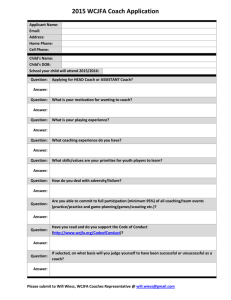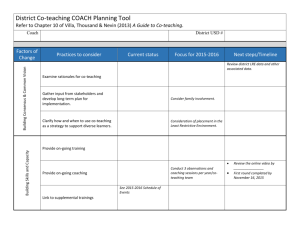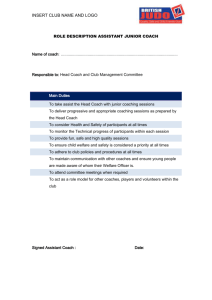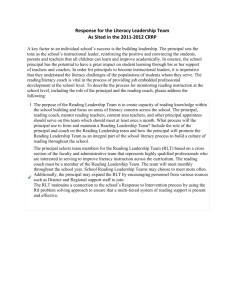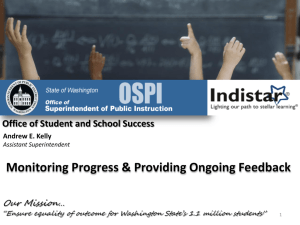Literacy Coaching Guide
advertisement
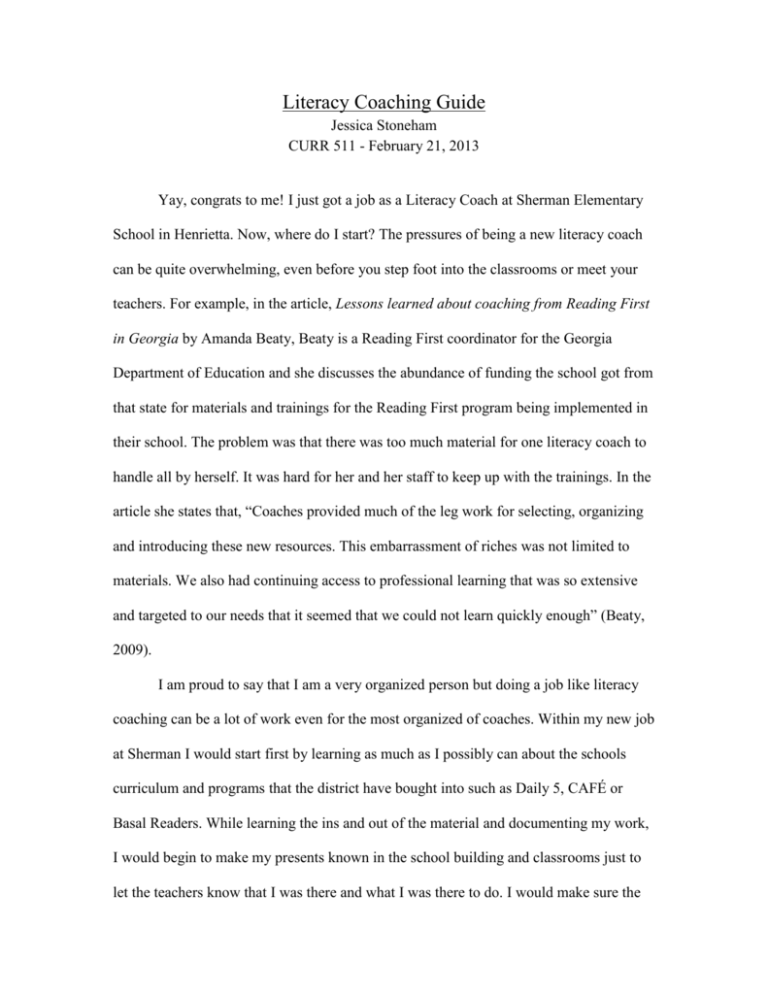
Literacy Coaching Guide Jessica Stoneham CURR 511 - February 21, 2013 Yay, congrats to me! I just got a job as a Literacy Coach at Sherman Elementary School in Henrietta. Now, where do I start? The pressures of being a new literacy coach can be quite overwhelming, even before you step foot into the classrooms or meet your teachers. For example, in the article, Lessons learned about coaching from Reading First in Georgia by Amanda Beaty, Beaty is a Reading First coordinator for the Georgia Department of Education and she discusses the abundance of funding the school got from that state for materials and trainings for the Reading First program being implemented in their school. The problem was that there was too much material for one literacy coach to handle all by herself. It was hard for her and her staff to keep up with the trainings. In the article she states that, “Coaches provided much of the leg work for selecting, organizing and introducing these new resources. This embarrassment of riches was not limited to materials. We also had continuing access to professional learning that was so extensive and targeted to our needs that it seemed that we could not learn quickly enough” (Beaty, 2009). I am proud to say that I am a very organized person but doing a job like literacy coaching can be a lot of work even for the most organized of coaches. Within my new job at Sherman I would start first by learning as much as I possibly can about the schools curriculum and programs that the district have bought into such as Daily 5, CAFÉ or Basal Readers. While learning the ins and out of the material and documenting my work, I would begin to make my presents known in the school building and classrooms just to let the teachers know that I was there and what I was there to do. I would make sure the administrator and teachers knew of my job description and what they could and could not count on me to do. Also I would start giving guidance throughout the school initially by arranging to meet with the teachers who want to meet with me first to avoid the idea of pushing my services onto someone who felt they didn’t need them. I would use my lack of knowledge of the curriculum to invite teachers in to “coach” me. Not in a formal setting such as a seminar or training but I would begin to build trusting relationships with the teachers and staff in the building by showing them my human side. For example, Beaty (2009), states that “teachers would have seen that the literacy coach was the one who was learning and that he or she was the first one taking the difficult step of teaching in public” when discussing the idea of having regional coaches come into the schools and teach the coaches in the schools the training material. I am not perfect and I don’t know it all. I would make it clear to my staff that I am an expert in what I do (coaching) but I’m still getting to know the specific curriculum and the way the school is run. Trainers need to be trained before they can train others. Once I have a strong trusting relationship base with the faculty and staff and they are fully aware of what they can expect from me I will begin the hard work of modeling lessons. But when will I have time? Can I coach after school? Can I coach during school? And how often will my administrators and teachers allow me to coach them, once a month or weekly? To tackle this next hurtle I would consider my options. I would need support from my administration. In the article, What Supports do Literacy Coaches Need from Administrators in Order to Succeed by Nancy Shanklin, she states that, coaches “need time to plan for all of the work they are doing. At least once a month they need the opportunity to attend professional development sessions to enhance their own knowledge and skill”(Shanklin, 2007). Literacy coaches and educators in general have to become lifetime learner. In the article, Do’s and Don’ts for Literacy Coaches: Advice from the Field by Rita Bean and Diane DeFord, the authors discuss the importance of “holding a collaborative stance to be a learner” so that we can “build new knowledge and extend our understanding toward common goals” (Bean & DeFord). In addition to the administration supporting the education of the coaches, the coaches need other supports such as time either during or after school to coach their staff. They “may need orientation to what data is collected and how the data is currently analyzed”, they may “need help learning to use a school’s data management system” and also they may “need to learn how to lead teachers in discussion of their data” while “reinforcing that the coach’s role is not to be evaluative, but to assist teachers in reflecting upon their work, learning new practices, analyzing student work and assessments, and designing more effective lessons” (Shanklin, 2007). As the new Literacy Coach at Sherman I would rely on my faculty and staff to support me in the same way that I am supporting them. Shanklin states in her 2006 article, What are the Characteristics of Effective Literacy Coaches that “all types of coaching need to be supportive rather than evaluative if they are to produce desirable changes in practice.” (Shanklin, 2006). The approach that I would use to model lessons to teachers would be to meet with my teacher individually either between classes or in a one on one meeting or in whole groups such as study groups or training to discuss what strategies they are currently using in their classrooms and what is going well with their implementations. Then we would collaborate as co-teaching team members to figure out what is not going as well and how we can tweak it so it fits better with the needs of the students in their particular classrooms. I would then do my research on both the students in the class and the research based strategies that are optional in the situation and model the new tweaked behaviors that we discussed to ensure that the changes would take place. When responding to the teacher with advice I will use choice words which take blame and judgment out of the conversation and imply equal responsibility in the situation at hand. I will try to respond to them in a way that makes them feel as if we are doing this together and that the teacher themselves is not completely at fault or responsible for the lack of success, if this is the case. It is important though at this time to keep in mind that everyone has different views on education and what teaching methods work the best. As Bean and DeFord state in their article, “coaches must be flexible and adjust what they do, depending on needs, interests, and the personalities of teachers” (Bean & DeFord). In this article they also state that, “depending on a specific situation, teachers will want to work in different ways. It is important, then, to remember that with the same teacher, a coach may serve as an expert, and then at a later date, work collaboratively to discuss a specific problem that has arisen” (Bean & DeFord). This meaning that teachers do not always need to be told exactly what to do, at time they may need a lot of guidance to correctly model a strategy in their classroom, but at times the teacher will only need small bits of feedback just to reassure themselves that they are doing the right thing. It’s easy to second-guess yourself and literacy coaches take a little bit of the pressure off of teachers by giving the gentle guidance needed to succeed. The use of literacy coaches has been a successful endeavor according to Michelle Vanderburg and Diane Stephens, authors of the 2009 article, What Teachers Say They Changed Because of Their Coach and How They Think Their Coach Helped Them. Within this article the Vanderburg and Stephens analyzed interviews with 35 teachers who worked with a coach for 3 years while in the first iteration of the South Carolina Reading Initiative (SCRI K-5) and discovered the various positive outcomes of the use of coaching within the school. For example, within the article the authors state that, “these teachers now had a place to voice their concerns, a place to work out their problems, and a place to celebrate their accomplishments”, “teachers spoke of how their coach encouraged their learning by helping them feel comfortable to ask questions and seek advice” and “teachers also valued how accessible their coaches were to come into their classrooms to observe or model a lesson” (Vanderburg & Stephens, 2009). In conclusion, I decided to use what I have learned about literacy coaching to teach and adult, my mother Diane, how to create a PowerPoint presentation on her computer pertaining to a month long business trip she had just taken. She was new to Mac Microsoft Office 2011 therefore I taught her the basic steps to creating a PowerPoint presentation including, opening up PowerPoint and choosing a template to work with, then I showed her how to add slides, pictures and text within the presentation, and lastly I showed her the proper way to save the document onto her computer. I then observed her doing the steps that I had shown her. She talked herself through the steps out loud and I tried my best to not jump in when I saw her getting sidetracked. I figured she would learn better if I allowed her to identify her errors on her own, I wanted to give her the chance to come to me for help instead of me pushing my services onto her, just as I would want to do for my teacher if I were their literacy coach. I then provided her with coaching after she got stuck on how to add a slide to the presentation. I talked her through the process verbally while modeling how to do it, and then I allowed her to do it on her own using the strategies that I had modeled to her. I observed her work and gave her feedback. Throughout this process I ensured her that I had the same troubles that she did when I first started using PowerPoint on my Mac and used choice words within my responses to her questions to make sure she felt comfortable with my coaching and not intimidated. Also I told her that I would help her the next time she had to make a presentation to ensure that she had the opportunity for professional development within her job because the place that she works does not offer professional developments such as these. I think teaching my mother how to create a PowerPoint made me reconsider my coaching methods. My mother has been a cooking coach to me my whole life and I made sure to reflect upon my experiences in the kitchen with her so that I could not make the same errors she did. She would take over the cooking if I started doing something wrong so this lead me to reflect on how that made me feel and how it did nothing but hurt my cooking confidence. I decided to focus on letting her discover her own errors and not jumping in immediately to fix them. Reflecting on past coaching experiences definitely created a better understanding of what it means to not only be a coach but also how it feels to be a student. It is so important to reflect on your work and to be a lifetime learner. References Bean, R., & DeFord, D. (n.d.). Do's and don'ts for literacy coaches: Advice from the field. Literacy Coaching Clearinghouse, 1-5. Retrieved from www.literacycoachingonline.org/ Beaty, A. (2009). Lessons learned about coaching from reading first in georgia. Literacy Coaching Clearinghouse, 1-4. Retrieved from www.literacycoachingonline.org/ Shanklin, N. (2006). What are the characteristis of effective literacy coaching?. Literacy Coaching Clearinghouse, 1-3. Retrieved from www.literacycoachingonline.org/ Shanklin, N. (2007). What supports do literacy coaches need form administrators in order to succeed?. Literacy Coaching Clearinghouse, 1-5. Retrieved from www.literacycoachingonline.org/ Vanderburg, M., & Stephens, D. (2009). What teachers say they changed because of their coach and how they think their coach helped them. Literacy Coaching Clearinghouse, 1-4. Retrieved from www.literacycoachingonline.org/

